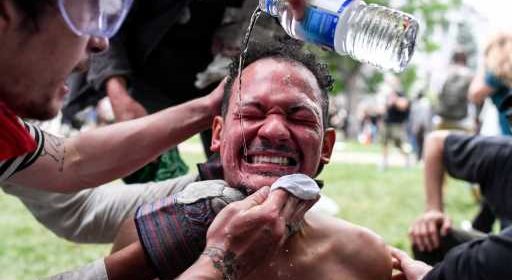Lawsuit against Denver police is first 2020 protest case to go to trial in the nation

On the second day of protests of police brutality in downtown Denver two years ago, police tear-gassed Hollis Lyman and shot a pepper ball through her homemade sign listing the names of Black men killed by police, leaving a quarter-sized hole in Philando Castile‘s handwritten name.
The next day, May 29, 2020, police sprayed dental student Stanford Smith in the face with pepper spray from close range. The day after that, police shot Zach Packard in the head with a less-lethal munition, knocking him unconscious and fracturing his skull.
The three Coloradans are part of a group of 12 plaintiffs taking the city of Denver to trial in federal court for how its police officers responded to the massive protests downtown that followed the murder of George Floyd by Minneapolis police.
It’s both the first civil trial to result from the slew of lawsuits filed against Denver following the demonstrations and, according to the ACLU of Colorado, the first such case stemming from the Floyd protests to go before a jury anywhere in the country.
Protesters in cities across the U.S. filed lawsuits alleging police in their communities violated their constitutional rights and used excessive force during the widespread demonstrations that followed Floyd’s murder by then-Officer Derek Chauvin on May 25, 2020.
In the Colorado case, the plaintiffs’ lawsuit alleges Denver police officers used excessive force against peaceful protesters and violated their constitutional rights because the department failed to properly train its officers on crowd control responses and that city officials sanctioned officers’ misconduct. Jurors will decide whether there is enough proof to support the plaintiffs’ claims and, if there is, how much money the city should pay.
“These were not the actions of rogue officers,” protesters’ attorney Tim Macdonald said in his opening statement. “The evidence will show it was Denver’s policies, practices and customs that led to the violations of plaintiffs’ rights.”
Denver officials already have settled several protest-related lawsuits and paid more than $1.3 million to injured demonstrators. The trial in the U.S. District Court of Colorado is expected to last three weeks and will place some of the Denver Police Department’s top leaders on the stand.
The 12 plaintiffs include a wide variety of professional backgrounds: attorneys, Colorado Education Association employees, a dentist, an artist, a mental health professional, an owner of a local coffee shop and a former employee for a police department in another state. None of the plaintiffs were acting violently or destroying property, Macdonald said, but they all left the protests bruised and bloodied by police officers’ pepper balls, foam munitions, tear gas and flash-bang grenades.
“They came to protest police violence and were met with police violence because the police did not like what they had to say,” said Makeba Rutahindurwa, attorney for the protesters.
The city’s attorney in her opening statement urged the jurors to take into account the totality of the chaotic protests and the situations police faced.
The downtown area experienced “unprecedented violence and destruction” and police struggled to safely isolate those breaking the law from those protesting peacefully, said Lindsay Jordan, of the Denver City Attorney’s Office.
More than 70 officers were injured responding to the protests, where people threw rocks, fireworks and bottles at police.
“When justifiable anger turns to violence and destruction, it is the duty of the police to intervene,” Jordan said.
The jury also will have to find that the alleged violations of the protesters’ constitutional rights were caused by the city of Denver’s policies and practices, or lack thereof, Jordan said.
Some of the city’s highest-ranking law enforcement officials were deposed for the lawsuit and are expected to testify at trial, including Denver police Chief Paul Pazen, Division Chief Ron Thomas and Patrick Phelan, the now-retired police commander who oversaw the department’s protest response. The city’s former independent monitor, Nick Mitchell, and other policing experts are expected to testify in the trial, Macdonald said.
The trial also will include memos completed by Mitchell’s office summarizing interviews the Office of the Independent Monitor completed with Denver police about the law enforcement response to the protests.
City attorneys have fought to keep those memos from the plaintiffs’ attorneys. Excerpts of the memos cited Monday showed a lieutenant and a captain criticize Pazen and other department leaders for a lack of leadership and coordination. The captain told the independent monitor that a lack of supervision and training was causing injuries to protesters and officers.
City officials have disciplined three officers for using inappropriate force against peaceful protesters. Nobody in police leadership has faced formal discipline for how the department handled the protests, despite a scathing report from the Office of the Independent Monitor that found police leaders communicated poorly and failed to keep accurate records of the response.
The failure to keep records and the lack of discipline against officers created an environment in which police could act without fear of accountability, the protesters’ attorneys argued in their opening statements.
The U.S. District Court judge overseeing the trial, Senior Judge R. Brooke Jackson, is the same judge who in June 2020 ordered Denver police officers to stop using projectiles and gas on peaceful protesters in a sweeping emergency order in response to a lawsuit filed the week that the protests began.
Testimony from witnesses is scheduled to begin 9 a.m. Tuesday.
Source: Read Full Article
